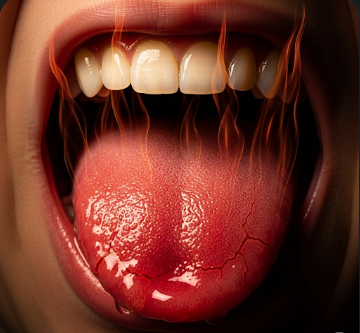Overview
Burning Mouth Syndrome (BMS) is a chronic oral condition characterized by a burning, scalding, or tingling sensation in the mouth, often without visible signs of irritation. It primarily affects the tongue, lips, gums, palate, or entire oral cavity and can significantly impact quality of life, eating, speaking, and sleep.
In Korea, BMS is recognized as a complex condition requiring multidisciplinary care involving dentists, neurologists, and mental health professionals. Korean clinics offer advanced diagnostic evaluations and tailored treatment approaches to manage symptoms and improve patient comfort.
What is Burning Mouth Syndrome?
BMS is a neuropathic pain disorder of the oral cavity, typically presenting without visible lesions. Key characteristics include:
- Persistent burning or scalding sensation, often worsening throughout the day
- Dry mouth (xerostomia) and altered taste perception, such as metallic or bitter taste
- Pain in the absence of visible inflammation, ulcers, or infection
- Symptoms lasting more than three months, defining the chronic nature of the condition
While the exact cause is often unclear, BMS is thought to involve nerve dysfunction, hormonal changes, or psychological factors.
Symptoms
Common symptoms of BMS include:
- Burning or scalding sensation in the tongue, lips, gums, palate, or entire mouth
- Dry mouth and increased thirst, even with adequate hydration
- Altered taste, including metallic, bitter, or salty sensations
- Pain or discomfort that fluctuates, often worse in the afternoon or evening
- Mouth sensitivity to hot, spicy, or acidic foods
- Occasional numbness or tingling in the affected areas
- Emotional distress, including frustration, anxiety, or depression due to chronic pain
Symptoms may develop gradually and can persist for months or years if left untreated.
Causes
The exact cause of BMS is multifactorial and may involve:
- Neuropathic dysfunction, including damage or altered function of oral sensory nerves
- Hormonal changes, particularly in postmenopausal women
- Nutritional deficiencies, including vitamin B12, folic acid, iron, and zinc
- Oral candidiasis or other infections that may exacerbate symptoms
- Medications, such as antihypertensives, antidepressants, or chemotherapy agents
- Allergies or sensitivity to dental materials, such as metals in fillings or dentures
- Psychological factors, including stress, anxiety, or depression
- Systemic conditions, such as diabetes, hypothyroidism, or autoimmune diseases
Risk Factors
- Female sex, particularly postmenopausal women
- Age over 50, with higher prevalence in older adults
- Nutritional deficiencies or restrictive diets
- Chronic medical conditions, such as diabetes or thyroid disorders
- Psychological stress, anxiety, or depression
- Use of certain medications affecting salivary flow or oral mucosa
Complications
While BMS itself is not life-threatening, it can lead to several physical and psychological complications:
- Reduced quality of life, affecting daily activities such as eating, speaking, and social interactions
- Unintentional weight loss due to avoidance of spicy or acidic foods
- Oral hygiene challenges, as pain may limit brushing or flossing
- Sleep disturbances caused by persistent oral discomfort
- Emotional distress, including anxiety, depression, and irritability
- Potential secondary infections, such as oral candidiasis, due to changes in saliva or oral care
Prevention
Although BMS cannot always be prevented, several strategies may help reduce risk or manage symptoms:
- Regular dental check-ups to identify and treat oral conditions early
- Balanced diet, rich in vitamins and minerals to prevent deficiencies
- Avoidance of irritants, such as tobacco, alcohol, acidic or spicy foods
- Stress management techniques, including meditation, yoga, or counseling
- Monitoring medication side effects with healthcare providers
- Good oral hygiene practices without over-irritating sensitive tissues
Treatment Options in Korea
Diagnosis
Diagnosis of BMS involves a thorough evaluation to rule out underlying conditions:
- Medical and dental history review, including symptom onset, duration, and triggers
- Oral examination to identify visible lesions or inflammation
- Laboratory tests to detect nutritional deficiencies, diabetes, thyroid disorders, or infections
- Salivary flow assessment to evaluate dry mouth
- Neurological assessment for neuropathic pain
- Psychological evaluation to identify anxiety, depression, or stress-related factors
Medical Management
Treatment aims to alleviate pain, correct deficiencies, and manage underlying conditions:
- Topical therapies, such as capsaicin rinses or lidocaine gels to reduce burning sensations
- Systemic medications, including tricyclic antidepressants, gabapentin, or clonazepam for neuropathic pain
- Saliva substitutes or stimulants to relieve dry mouth
- Nutritional supplementation for deficiencies in vitamin B12, iron, folic acid, or zinc
- Antifungal therapy, if oral candidiasis is present
Behavioral and Supportive Therapies
- Cognitive behavioral therapy (CBT) to manage pain perception and emotional distress
- Stress reduction techniques, including meditation, relaxation exercises, or counseling
- Dietary modifications, avoiding spicy, acidic, or irritating foods
- Regular oral care routines to maintain hygiene without aggravating discomfort
Advanced Therapies
- Laser therapy for mucosal sensitivity in select cases
- Neuromodulation or nerve-targeted treatments for refractory neuropathic pain
- Multidisciplinary care, integrating dentists, neurologists, and mental health professionals
Prognosis
The prognosis of BMS varies depending on underlying causes and treatment response:
- Symptom relief is achievable with a combination of medical, dietary, and behavioral therapies
- Some patients experience persistent symptoms, requiring long-term management
- Early identification of nutritional deficiencies or systemic conditions improves outcomes
- Multidisciplinary care in Korea ensures comprehensive management, improving quality of life and minimizing complications
With targeted therapy, supportive care, and lifestyle adjustments, individuals with Burning Mouth Syndrome in Korea can reduce discomfort, manage symptoms effectively, and maintain oral and overall health.













